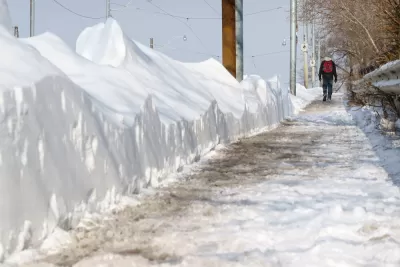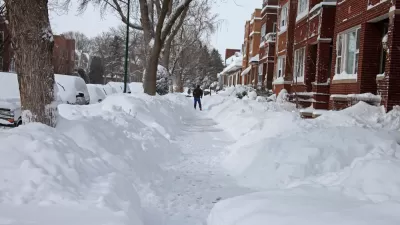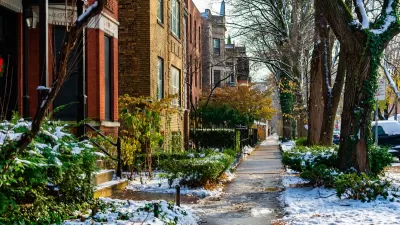When snow is not cleared from sidewalks, pedestrians face significant hazards and they are less inclined to walk.

In many U.S. cities, snow removal on sidewalks is the responsibility of property owners, an odd system where private citizens maintain public infrastructure, writes Amy Crawford.
When property owners are negligent or lack the physical or financial capabilities to clear their sidewalks, an entire block can become impassable. "For pedestrians, the result is an obstacle course of icy goat trails, towering snow piles, and puddles of slush," says Crawford.
But when cities plow streets and neglect sidewalks, driving gets priority over other modes. Some municipalities have taken on the responsibility of keeping sidewalks clear.
Crawford says that encouraging residents to use more sustainable modes of transportation, such as walking, is meaningless if safe, accessible infrastructure is not available during a significant part of the year.
In Ann Arbor, Michigan, for example, the city council set a carbon neutrality goal that would require people to drive less. "But here, and in others cities across America, efforts to nudge people out of their cars were once again seemingly forgotten as soon as the flakes started falling this winter. It’s then, as plows head out to clear and salt major arterial roadways, that a city’s true priorities are revealed," adds Crawford.
FULL STORY: The Way a City Handles Snow Says Everything About How It Treats Pedestrians

Maui's Vacation Rental Debate Turns Ugly
Verbal attacks, misinformation campaigns and fistfights plague a high-stakes debate to convert thousands of vacation rentals into long-term housing.

Planetizen Federal Action Tracker
A weekly monitor of how Trump’s orders and actions are impacting planners and planning in America.

Chicago’s Ghost Rails
Just beneath the surface of the modern city lie the remnants of its expansive early 20th-century streetcar system.

Bend, Oregon Zoning Reforms Prioritize Small-Scale Housing
The city altered its zoning code to allow multi-family housing and eliminated parking mandates citywide.

Amtrak Cutting Jobs, Funding to High-Speed Rail
The agency plans to cut 10 percent of its workforce and has confirmed it will not fund new high-speed rail projects.

LA Denies Basic Services to Unhoused Residents
The city has repeatedly failed to respond to requests for trash pickup at encampment sites, and eliminated a program that provided mobile showers and toilets.
Urban Design for Planners 1: Software Tools
This six-course series explores essential urban design concepts using open source software and equips planners with the tools they need to participate fully in the urban design process.
Planning for Universal Design
Learn the tools for implementing Universal Design in planning regulations.
planning NEXT
Appalachian Highlands Housing Partners
Mpact (founded as Rail~Volution)
City of Camden Redevelopment Agency
City of Astoria
City of Portland
City of Laramie





























